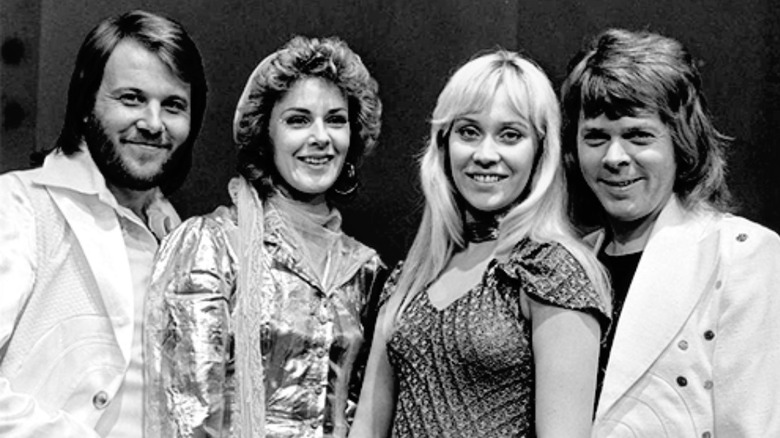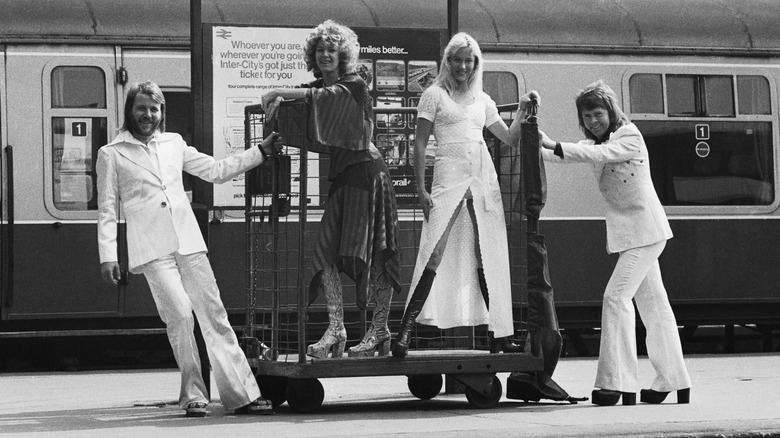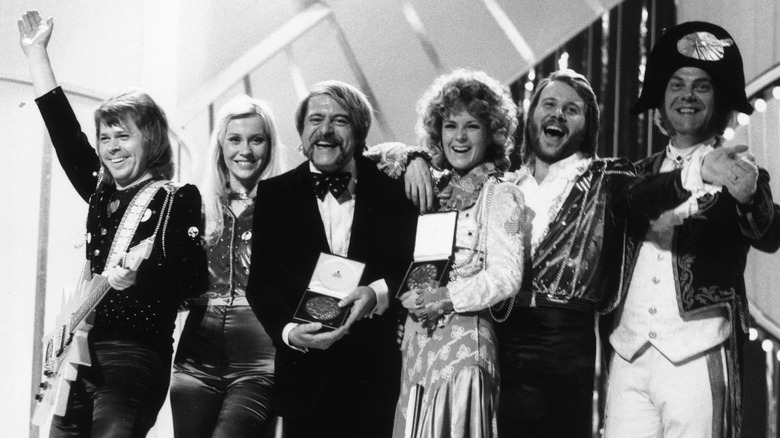Here's How ABBA Essentially Pioneered Reality Entertainment
When you think of reality television, shows like "Keeping Up with the Kardashians," "The Real Housewives" and "The Bachelor" might head the list of popular options. But the genre that exploded more than two decades ago goes back earlier than you think — and it has some surprising contributors.
"Candid Camera," asserts Screenrant, takes the spot as the earliest reality show, with it starting on radio in 1947 before appearing on TV a year later as "Candid Mike" before settling with its most-known name, "Candid Camera."
The first show to create the modern reality TV construct, where a camera follows a group of humans through their daily activities, was PBS' "An American Family," reported Variety. In this 1973 show, crews recorded the Loud family's day-to-day interactions, capturing the dissolution of parents, Bill and Pat's, 21-year-old marriage. The show resonated with the public, getting 10 million viewers.
Other shows like "Real People" (1979 to 1984), "Cops" (32 seasons starting in 1989) and "The Real World" (33 seasons, beginning in 1992; its newest version, "The Real World: Homecoming: New York," premiered in 2021) followed. Along the way, some surprising people became involved in the format, including the Swedish musical sensation, ABBA.
The Rise of ABBA
Yes, that's right. The Swedish Europop foursome — Benny Andersson, Björn Ulvaeus, Agnetha Fältskog, Anni-Frid Lyngstad — that spawned the hits "Dancing Queen," "Mamma Mia" and "Waterloo," helped pioneer reality television.
Back in the 1970s, their songs seemed to be everywhere. Britannica called the band one of the top commercial successes in pop music's history. The group became famous after winning Eurovision, an international talent contest, in 1974. They went on to sell more than 380 million albums and singles to a global market, according to The Sun.
The performers — known for their outrageous costumes — disbanded in 1982, in part, to pursue solo careers. Fältskog married Ulvaeus in 1971, and Lyngstad and Andersson tied the knot seven years later, according to Express. The relationships struggled during the band's success and both couples eventually divorced. While the uncoupling inspired the song, "The Winner Takes It All," ultimately the separations took its toll on the group.
ABBA's foray into reality programming happened a few years prior to the band's demise. Their fourth studio album, "Arrival," "arrived" in 1976 and it cemented their status as bona fide international stars. It included their signature tune, "Dancing Queen," the only effort they released that hit No. 1 on the American charts, according to the Guardian.
ABBA makes it real
The 1977 tour, supporting the record, stopped in Europe and Australia. About a quarter of a million concertgoers attended. The tour was slated for more than music, though. During the Australian concerts, the performances were recorded, according to ABBA-the Concerts with the intention of creating a behind-the-scenes view for fans, along with a loose fictional storyline about an Australian country and western DJ named Ashley (played by Robert Hughes) pursuing the group for an interview. It was directed by Lasse Hallström ("What's Eating Gilbert Grape"), the man behind most of their music videos.
"ABBA: The Movie," came out in 1977 at the same time as their fifth album, "ABBA: The Album." Rolling Stone called it "a mix of concert footage, music videos, "candid" backstage footage (filmed months later at a Stockholm hotel) and man-on-the-street interviews."
Part documentary, part scripted story, the film embraced many aspects that appear in the reality genre now, and served as a precursor to what we see on TV today. But it never generated huge revenues, earning just $38 million worldwide, according to Box Office Mojo.


